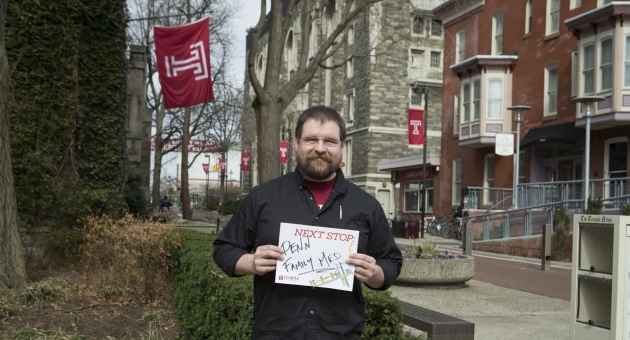Next stop: University of Pennsylvania
Seneca Harberger: MD, Temple School of Medicine

Seneca Harberger comes from a medical family: His father is a family doctor, his mother is a nurse-practitioner, and his brother attended medical school. While a career in medicine was always a possibility for Harberger, too, as an undergraduate at California’s Harvey Mudd College he studied physics.
After completing his degree, the York, Pennsylvania, native took a job teaching high school in Oakland, California.
“That experience helped galvanize my interest in medicine and underserved populations,” said Harberger, who is graduating from Temple’s School of Medicine. “I really enjoyed helping people address the problems they face in their lives, and medicine offered an opportunity to do that.”
When his wife began graduate school back in Pennsylvania, Harberger decided the time was right to pursue what had always been his default career choice: medicine. And because he wanted to help disadvantaged populations, Temple was the logical choice when applying to medical school.
“I think Temple School of Medicine was the best match because of the patients we get to serve and the mindset of a lot of the faculty mentors we have here,” he said. “I got just about as lucky as I could get with Temple accepting me.”
Harberger, who received a prestigious 2014 Pisacano Scholarship for his fourth year at Temple, believes he would have gotten a practical education at any medical school. But at Temple, according to Harberger, the faculty do an incredible job of mentoring students, harnessing their interests and then guiding them to use those interests in a practical way.
“The faculty mentors here at Temple’s School of Medicine help you develop a practical idealism and prepare you for the realities of the unique challenges presented by a diverse and underserved population,” he said. “I really think I’m going to do a better job as a resident serving patients because of them.”
Harberger, who will soon begin his residency in family medicine at the University of Pennsylvania’s Presbyterian Hospital, said his goal for the future is to continue serving disadvantaged populations, whether at an academic medical institution like Temple or a public health center.
“My residency will end in three years, and at that time, I would hope that I have enough experience in both of those settings to determine if I want to go one way or the other,” he said. “But the end goal is the same: to work to meet the needs of that underserved population.”